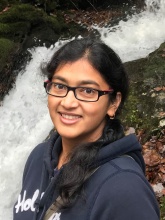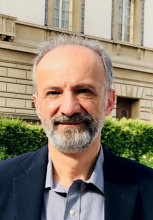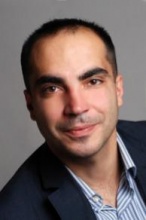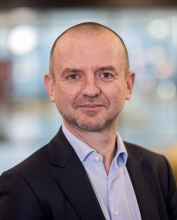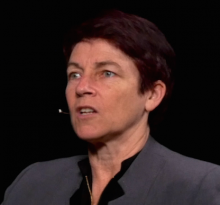CPS Events
Flow-Based Cyber-Physical Systems
Abstract:
Flow-based systems are physical systems, such as water distribution systems, oil & gas pipelines, and human cardiovascular systems, that can be modeled as a flow network in which a physical entity, e.g., water, oil or blood, flows through the edges of the network. Observing these critical systems for monitoring and exploration purposes is of paramount importance. This talk highlights the challenges and approaches to study flow-based systems using a Cyber-Physical Systems (CPS) approach. The path towards such a CPS approach faces several research challenges. A CPS has three key components – Communication, Computation, and Control. First, there is a need to encompass the existing technology into an efficient system design (e.g., designing an efficient system design to incorporate mobile wireless sensors moving through water pipelines to monitor Water Distribution Systems). From the communication perspective, traditional networking paradigms may be insufficient to address the challenges in certain environments. From the computation perspective, there is a need to process the information collected and optimize the cost and benefit of monitoring (e.g., minimizing the number of sensors to achieve a sensing coverage). From a controls perspective, the challenge is to take efficient control decisions to achieve a desired performance (e.g., controlling the flow of water to drive sensors to specific regions). The talk will use Water Distribution Systems as a primary case study and include discussions of on-going efforts in applying the approach to other flow-based systems.
Bio:
Mahima Agumbe Suresh is an Assistant Professor at San Jose State University. She received her Ph.D from the Department of Computer Science and Engineering at Texas A&M University in December 2015, advised by Dr. Radu Stoleru. After her Ph.D, she was a postdoctoral researcher at Xerox Research Labs, India, where she worked on crime analytics and process mining. Her research interests include algorithms, protocol design and modeling, and system design for cyber-physical systems and Internet of Things. She has been published in several peer reviewed conferences and journals, and has been a program committee member at several conferences.
Collision Free Navigation with Interacting, Non-Communicating Obstacles
Abstract:
This talk addresses navigation in an environment occupied by other interacting agents (e.g. vehicles, robots, pedestrians…) with no direct communication to one another. In contrast to the path planning problem, the difficulty here is that agents cooperate and compete, creating feedback loops each only partially controls. The talk starts with a very high level overview of two control design methods: Model Predictive Control (MPC) and Control Barrier Functions (CBF). The MPC is powerful, yet computationally expensive. The CBF approach is computationally simpler and handles non-convex constraints gracefully, while, being recently introduced, is only partially understood. Performance of a CBF controller is illustrated with a real industrial robot avoiding a stationary cone. The problem with interacting, non-communicating agents is much more difficult than avoiding stationary objects. Each agent has only a portion of the information needed to find the optimal or even a feasible action. Another difficulty is that, unless other agents are treated as non-interacting, the computational burden grows quickly with the number of agents. Additionally, this talk reviews these approaches: CBFs, Mixed Integer Programming, and Reinforcement Learning. In simulations, a CBF-based approach developed in-house showed good performance in avoiding collisions, not only when all the agents are implementing the same algorithm, but also when an agent becomes non-interacting or is even actively pursuing another agent. The computational load remains reasonable with each agent, as the host is able to handle up to about 20-25 interacting targets on a 3GHz computer.
Bio:
Mrdjan Jankovic received his doctoral degree from Washington University, St. Louis in 1992. He held postdoctoral positions with Washington University and UC Santa Barbara, before joining Ford in 1995. He is currently a Senior Technical Leader at Ford Research, working on the development of control technologies for powertrain and driver assist applications. Dr. Jankovic co-authored one book, four book chapters, and more than 100 technical papers. He is a co-inventor on more than 80 US patents, with more than 20 used in Ford products. He received AACC Control Engineering Practice Award, IEEE Control Systems Technology Award, Ford’s prestigious Dr. Haren Gandhi Research and Innovation Award, and best paper awards from IEEE, SAE, and AVEC. Dr. Jankovic is a Fellow of the IEEE.
Learning MPC in Autonomous Systems
Abstract:
Forecasts play an increasingly important role in the next generation of autonomous and semi-autonomous systems. Applications include transportation, energy, manufacturing and healthcare systems. Predictions of systems dynamics, human behavior and environment conditions can improve safety and performance of the resulting system. However, constraint satisfaction, performance guarantees and real-time computation are challenged by the growing complexity of the engineered system, the human/machine interaction and the uncertainty of the environment where the system operates. Our research over the past years has focused on predictive control design for autonomous systems performing iterative tasks. In this talk I will first provide an overview of the theory and tools that we have developed for the systematic design of learning predictive controllers. Then, I will focus on recent results on the use of data to efficiently formulate stochastic MPC problems which autonomously improve performance in iterative tasks. Throughout the talk I will focus on autonomous cars to motivate our research and show the benefits of the proposed techniques.
More info on: www.mpc.berkeley.edu
Bio:
Francesco Borrelli received the `Laurea' degree in Computer Science Engineering in 1998 from the University of Naples `Federico II', Italy. In 2002, he received a Ph.D from the Automatic Control Laboratory at ETH-Zurich, Switzerland. He is currently a Professor at the Department of Mechanical Engineering of the University of California at Berkeley, USA. He is the author of more than one hundred publications in the field of predictive control. He is the author of the book, Predictive Control, published by Cambridge University Press, the winner of the 2009 NSF CAREER Award and the winner of the 2012 IEEE Control System Technology Award. In 2016, he was elected IEEE fellow. In 2017, he was awarded the Industrial Achievement Award by the International Federation of Automatic Control (IFAC) Council. Since 2004, he has served as a consultant for major international corporations. He was the founder and CTO of BrightBox Technologies Inc, a company focused on cloud-computing optimization for autonomous systems. He is the co-director of the Hyundai Center of Excellence in Integrated Vehicle Safety Systems and Control at UC Berkeley. His research interests are in the area of model predictive control and its application to automated driving and energy systems.
Network Monitoring of Industrial Control Systems: The Lessons of Security Matters.
Abstract:
Established in 2009 in the Netherlands as a University spin-off by a Professor and two PhD students, SecurityMatters was acquired in 2018 by the American ForeScout Technologies Inc. (NASDAQ:FCST). SecurityMatters pioneered a new way of realizing network monitoring for cybersecurity that proved very successful in the Critical Infrastructure domain (Oil and Gas, Power Generation, Energy Distribution etc.). Besides a success story, SecurityMatters has also represented an enormous learning experience, benchmarking different approaches against reality. In this lecture, one of the founders of SecurityMatters will give his unsweetened opinion regarding what works and what does not work, when it comes to network monitoring.
Bio:
Sandro Etalle is an entrepreneur and a full professor and head of the Security group at the TU Eindhoven. He earned his PhD at the University of Amsterdam (1995). Before switching to the academic career he was co-founder of two Italian technology companies: TecLogic and ICON (www.icon.it). In 2009, Etalle founded SecurityMatters (www.secmatters.com) together with PhD students D. Bolzoni and E. Zambon. At SecurityMatters, Etalle served as CEO for over 4 years and as Chairman of the Board until the exit. SecurityMatters factually changed the way of monitoring Industrial Systems and maintaining a leadership position in its segment. At the TU Eindhoven, Etalle leads the TU/e Security and Embedded Networked Systems section, counting over 40 employees, and the Security group, which is part of it. Beyond the TU/e, Etalle is a Visiting Professor at the University of Trento and Lecturer at the Bologna Business School.
CITRIS/CPAR and CPSRC Seminar: The Economics of Robotics
Abstract:
This seminar is a review of the latest investments into the robotics industry, and how difficulties in the categorization of the robotics industry in US and overseas hinders awareness of emerging robotics technologies. In 2014, the robotics industry hit two tipping points. One was a huge increase in funding going into new areas of emerging robotics industries, and the other has been the move away from traditional market analytics based on sales figures to predict future growth, towards the much more complex analysis of disruption, market cycles, and effectively trying to read the entrails of the investment industry.
Bio:
Andra Keay is the Managing Director of Silicon Valley Robotics, the non-profit industry group supporting innovation and commercialization of robotics technologies. Andra is also founder of the Robot Launch Global Startup Competition, Robot Garden Maker Space, and Women in Robotics. She is a mentor, investor and advisor to startups, accelerators and think tanks, with a strong interest in commercializing socially positive robotics and AI. She joined CITRIS People and Robots Research Group as a Visiting Scholar.

